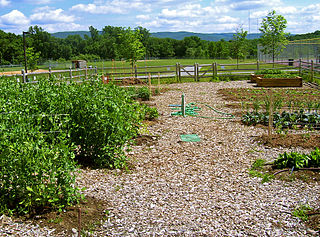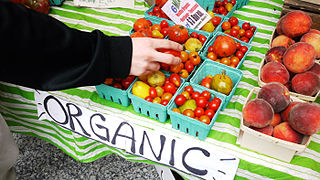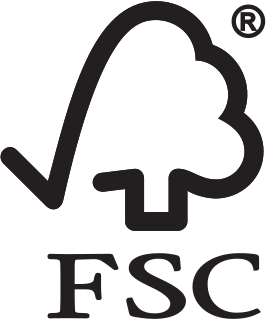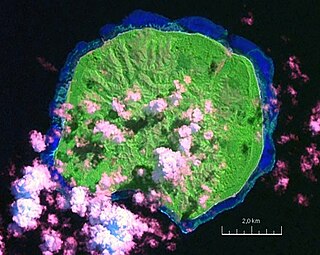
Organic farming is an agricultural system that uses fertilizers of organic origin such as compost manure, green manure, and bone meal and places emphasis on techniques such as crop rotation and companion planting. It originated early in the 20th century in reaction to rapidly changing farming practices. Certified organic agriculture accounts for 70 million hectares globally, with over half of that total in Australia. Organic farming continues to be developed by various organizations today. Biological pest control, mixed cropping and the fostering of insect predators are encouraged. Organic standards are designed to allow the use of naturally-occurring substances while prohibiting or strictly limiting synthetic substances. For instance, naturally-occurring pesticides such as pyrethrin and rotenone are permitted, while synthetic fertilizers and pesticides are generally prohibited. Synthetic substances that are allowed include, for example, copper sulfate, elemental sulfur and Ivermectin. Genetically modified organisms, nanomaterials, human sewage sludge, plant growth regulators, hormones, and antibiotic use in livestock husbandry are prohibited. Organic farming advocates claim advantages in sustainability, openness, self-sufficiency, autonomy and independence, health, food security, and food safety.

The following outline is provided as an overview of and topical guide to organic gardening and farming:
Vegan organicagriculture is the organic production of food and other crops with minimal animal inputs. Vegan organic agriculture is the organic form of animal-free agriculture.

The organic movement broadly refers to the organizations and individuals involved worldwide in the promotion of organic food and other organic products. It started during the first half of the 20th century, when modern large-scale agricultural practices began to appear.

Organic certification is a certification process for producers of organic food and other organic agricultural products. In general, any business directly involved in food production can be certified, including seed suppliers, farmers, food processors, retailers and restaurants. A lesser known counterpart is certification for organic textiles that includes certification of textile products made from organically grown fibres.
The International Federation of Organic Agriculture Movements is the worldwide umbrella organization for the organic agriculture movement, which represents close to 800 affiliates in 117 countries.

The Forest Stewardship Council (FSC) is an international non-profit, multistakeholder organization established in 1993 that promotes responsible management of the world's forests. It is an example of a market-based certification program used as a transnational environmental policy.

Cicia is a Fijian island of the Lau Group. One of the Northern Lau Islands, Cicia is volcanic and is composed of raised coral. Its area is 34 square kilometres (13 sq mi).
The Principles of Organic Agriculture were established by the International Federation of Organic Agriculture Movements (IFOAM) in September, 2005. They are aspirations for organic farming. The Principles were approved by the General Assembly of IFOAM on September 25, 2005.
Public participation, also known as citizen participation or patient and public involvement, is the inclusion of the public in the activities of any organization or project. Public participation is similar to but more inclusive than stakeholder engagement.
The Organic Trade Association (OTA) is a membership-based business association that focuses on the organic business community in North America. OTA's mission is to promote ethical consumerism, promoting and protecting the growth of organic trade to benefit the environment, farmers, the public and the economy. OTA is a member of The International Federation of Organic Agricultural Movements (IFOAM) and The International Working Group on Global Organic Textile Standard.

The China Green Food Development Center is the first agency in the People's Republic of China to oversee organic food standards. The Center was established in November 1992 under the jurisdiction of the Ministry of Agriculture of the People's Republic of China. The CGFDC joined the International Federation of Organic Agriculture Movements(IFOAM)in 1993. It is headquartered in Beijing, where its general office and divisions of logo management, authentication, sci-tech and standards, planning and finance, and international cooperation are located. Currently, the CGFDC has set up 42 local food regulatory agencies, commissioned 38 quality inspection agencies, and 71 green food producing environmental monitoring branches. Its basic purpose is to promote the development of food that prioritizes safety, to protect the environment, and to maintain the development of economy and society. Its main responsibilities include: developing Green Food generation policies; regulating organizations that develop green food standards; organizing and guiding the development and management of Green Food; trademark green logo management; review and approval of green flag products; and organizing research, technology promotion, training, advocacy, information services, green building demonstration bases, and foreign economic and technological exchanges and cooperation. The CGFDC's main partners consist of China Organic Food Certification Center, State Food and Nutrition Consultant Committee, Food and Agricultural Organization of the United Nations and Development Research Center of the State Council as well as some media networks as supporters. It has published reports including the " Green Food Products Bulletin","Green Fashion", and "Brief Report of the Center."

Organic wine is wine made from grapes grown in accordance with principles of organic farming, which typically excludes the use of artificial chemical fertilizers, pesticides, fungicides and herbicides.

Organic farming is practiced around the globe, but the markets for sale are strongest in North America and Europe, while the greatest dedicated area is accounted for by Australia, the greatest number of producers are in India, and the Falkland Islands record the highest share of agricultural land dedicated to organic production.
Organic farming practices in New Zealand date from 1930 but began on a commercial scale in the 1980s and is now an increasing segment of the market with some of the larger companies such as Wattie's becoming involved.
Organic aquaculture is a holistic method for farming fish and other marine species in line with organic principles. The ideals of this practice established sustainable marine environments with consideration for naturally occurring ecosystems, use of pesticides, and the treatment of aquatic life. Managing aquaculture organically has become more popular since consumers are concerned about the harmful impacts of aquaculture on themselves and the environment.
Sustainability standards and certifications are voluntary guidelines used by producers, manufacturers, traders, retailers, and service providers to demonstrate their commitment to good environmental, social, ethical, and food safety practices. There are over 400 such standards across the world. The trend started in the late 1980s and 90s with the introduction of Ecolabels and standards for Organic food and other products. Most standards refer to the triple bottom line of environmental quality, social equity, and economic prosperity. A standard is normally developed by a broad range of stakeholders and experts in a particular sector and includes a set of practices or criteria for how a crop should be sustainably grown or a resource should be ethically harvested. This might cover, for instance, responsible fishing practices that don't endanger marine biodiversity, or respect for human rights and the payment of fair wages on a coffee or tea plantation. Normally sustainability standards are accompanied by a verification process - often referred to as "certification" - to evaluate that an enterprise complies with a standard, as well as a traceability process for certified products to be sold along the supply chain, often resulting in a consumer-facing label. Certification programmes also focus on capacity building and working with partners and other organisations to support smallholders or disadvantaged producers to make the social and environmental improvements needed to meet the standard.

The National Association for Sustainable Agriculture, Australia (NASAA) is an Australian and international organic certifying agency and trade association, located in Stirling, South Australia.
Asia Regional Organic Standard (AROS) is a common regional standard for organic production in East, South-East and South Asia. AROS results from a process intended to harmonize existing organic standards in that region and to promote new ones. It was launched by the Global Organic Market Access (GOMA) project, sponsored by Food and Agriculture Organization of the United Nations (FAO), International Federation of Organic Agriculture Movements (IFOAM), and United Nations Conference on Trade and Development (UNCTAD).
Globalization of supply chains and pressure to lower production costs have negatively impacted environments and communities around the world, especially in developing nations where production of high demand goods is increasingly taking place. Since the 1990s, awareness of these negative impacts has grown, leading stakeholders to push companies to take responsibility and actively work to improve the sustainability of their supply chains. It has come to be understood that a company is only as sustainable as the start of its supply chain, bringing about the need for sustainable sourcing. Sustainable sourcing refers to the inclusion of social, environmental, and economic criteria in the sourcing process.